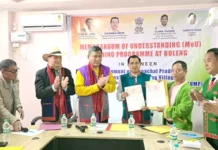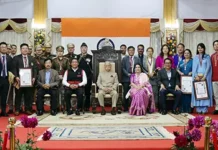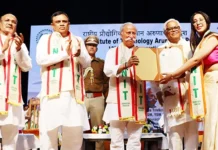DELHI, Jan 16: As the global elite network at Davos, people across the world are increasingly taking to the streets to protest in the name of inequality. Disparity, the film, featuring nine Nobel laureates and narration by Sir Ben Kingsley, is a long overdue reckoning to help reverse the appalling gap between the rich and the poor.
The Western narrative portrays aid wastage as mainly being down to corrupt developing country leaders embezzling funds, which is a distorted stereotype, because the real scandal is the donor countries who give aid with strings attached. Disparity examines contradictions in donor aid policy whereby almost 20 percent of aid is given to recipient countries in order to get trade and influence in return. For example, 90 percent of British aid contracts flow back to UK firms, which increases project costs by 25 percent – a huge obstacle for developing countries who are denied access to these contracts. So, aid is ‘tied’ to advance the donor’s own economic and political interests at the cost of prolonging merciless poverty.
Disparity, which examines the structural problems of rampant inequality and poverty that ravage more than half the world’s populations, is now available on the Tiger Tim media YouTube channel, subtitled in Hindi to enable as many people as possible to watch and share the film – so united, they can be informed and empowered to take on these entrenched vested western interests. The film features a major solution to clean up foreign aid (see addendum).
This initiative is backed by luminaries; 16 Nobel laureates including Archbishop Tutu and the Dalai Lama, UN ambassadors including Michael Douglas and Paulo Coelho, cultural icons including Sir Ben Kingsley and Stephen Fry, as well as academics, economists and world leaders.
One month ago, filmmaker Renu Mehta launched an appeal to the West to take the Tiger Tim challenge – to swap two hours of entertainment to make a stand for equality. Mehta’s plea to citizens has largely gone unheeded. She said, “Amidst all our wealth, people are hungry, thirsty, sick, homeless, desperate, isolated and ignored. So the least we can do is take two hours out of our comfort zone to watch Disparity, sign the real aid petition calling for fairer aid policies, and to nominate someone else to take the same challenge.”
Mehta believes it’s now time for the global south to self-mobilize, to drive a mass movement calling for real aid, so their voices can be heard in the North, to ultimately change the destinies of those trapped in poverty.
International Federation of Journalists Vice-President Sabina Inderjit said, “Inequality in the world’s largest democracy and second most populated country, India, stares one in the face. Sadly, the oft-heard promise of ‘inclusive growth’ by governments turns out to be mere words as the gap between the rich and the poor is widening and worse sharper. Clearly, the policies aimed at development aren’t changing lives as envisaged or for that matter aid not reaching the people it’s meant for.”
While millions continue to live in squalor, the rich are getting richer. The opulence on one side and poverty on the other is jarring. The nation’s financial capital, Mumbai, houses Asia’s richest man and also the largest slum in South Asia! The media duly reports shocking statistics such as a fraction of India’s population, 10 percent holds 77 percent of the nation’s total wealth, whereas the bottom 60 percent owns merely 4.8 percent of the wealth or the top nine billionaires are equivalent to the wealth of the bottom 50 percent of population. It makes headlines, like other news of farmers suicides, infant deaths, mega bungling in midday meals in schools, child labour, etc, but the media needs to do more – dig in, investigate, create greater awareness, build that public opinion to make governments answerable.
Unfortunately, that role has got somewhat blurred in today’s crass, competitive media. It needs to be reignited. The film Disparity could well be a spark or a lead for journalists to unmask scandals and corruption which ails societies globally.
The film also shows that real aid goes hand-in-hand with a free and vibrant media. Journalism is at the forefront of driving accountability and progressive policy reform, but journalists investigate often under terrible repressive conditions. That is why the international community should properly protect their media freedoms, so they can play an even bigger role in advancing development and democracy.



